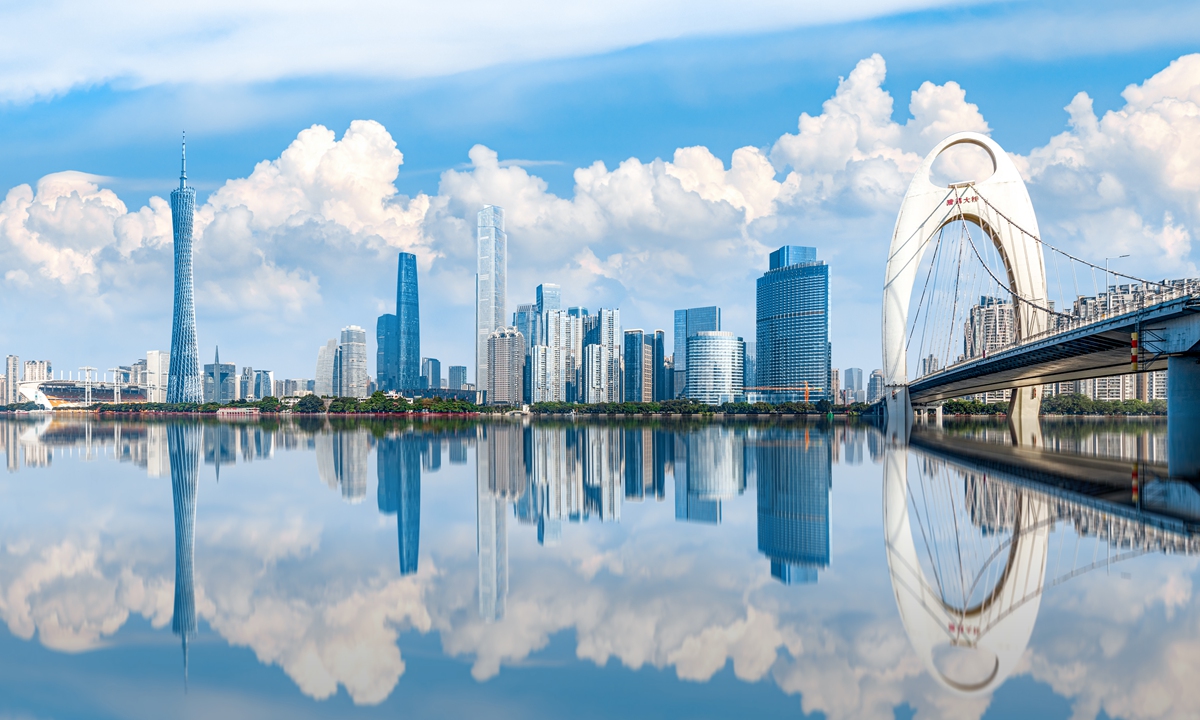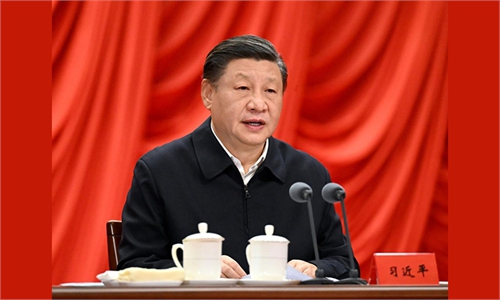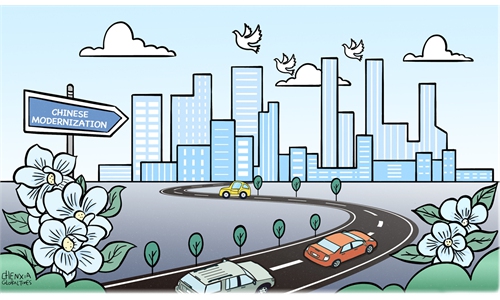
City view of Guangzhou, South China's Guangdong Province Photo: VCG
Editor's Note:
Chinese President Xi Jinping stressed the importance of correctly understanding and vigorously advancing Chinese modernization while addressing the opening of a study session at the Party School of the CPC Central Committee (National Academy of Governance) earlier this month. Xi said Chinese modernization is a new model for human advancement, and it dispels the myth that "modernization is equal to Westernization." What're the differences between Chinese modernization and Westernization? What inspirations can other countries learn from Chinese modernization? Global Times (GT) reporter Yu Jincui interviewed Giancarlo Elia Valori (Valori), an Italian expert on international affairs, over these issues. This is the second piece of the series on Chinese modernization.
GT: There has long been a myth that "modernization is equal to Westernization." How do you respond to this view?
Valori: I would like to point out the essential difference, i.e. the erroneous meaning of modernization in the West. Here in the West, modernization - or more correctly "Westernization" as you better put it - only means the exaltation of technocracy, markets and trade in the liberal-bourgeois meaning of the term, and the annulment of the concept of independent politics. This presupposes the attempt to annul every metaphysical value that is linked to political, religious, national and humanitarian ideals: in other words, considering man, or the event, only in function of profit, money, the gain of a few on a mass that is desired to be amorphous, deprived of feelings and homologated to the capitalist system of production.
GT: How do you interpret the essence of Chinese modernization?
Valori: Chinese modernization is not a vision that the People's Republic of China wants to impose on other countries, as is the case with the attempts at Westernization which they attempt to impose on the world at all costs.
Seeking satisfaction for the Chinese people and the rejuvenation of the nation is the basic mission of Chinese modernization. The establishment of the People's Republic of China has created the basic social conditions for the modernization of the country, and this is certainly not a recent topic.
In the current reform period, the social productive forces are being freed and developed to make great strides in national construction and provide a system guarantee full of new vitality and material conditions for fast development. The era of socialism with Chinese characteristics provides a more comprehensive institutional guarantee, a more solid material basis and a more proactive spiritual force toward national modernization.
It combines the fundamental principles of Marxism with Chinese characteristics typical of the specific reality of China and its traditional culture. The drive for modernization, the deepening of its theoretical understanding, the continuing strategic maturation and enrichment of practice, have been advanced in a series of ideas, new insights and forward-looking conclusions, which enrich and develop modernization theories. It is a new analysis of the theories that have promoted the country's historic achievements and changes for years.
China aims to basically achieve socialist modernization by 2035. It strives to basically realize the new type of industrialization, informatization, urbanization, and agricultural modernization, establishing a modernized economic system. Contrary to what is hyped by some Western propaganda, there is no single modernization model in the world, nor is there a standard universal model with instruction manuals.
GT: Chinese modernization is the modernization of a huge population, of common prosperity for all, of material and cultural-ethical advancement, of harmony between humanity and nature, and of peaceful development. What inspirations can Chinese modernization offer to other countries?
Valori: The analysis of Chinese modernization theory is essentially the treatment of a country with a huge population, based on a profound synthesis of the experience and lessons of the practice and the mistakes of modernizations in other countries of the world.
Firstly, China's population is over 1.4 billion. The difficulty and complexities this poses are unprecedented, and the development path and promotion method must also have their own characteristics.
Secondly, common prosperity is the prerequisite, and it is also a long-term historical process. Chinese modernization adheres to the rationale of people-centred and not market-centred development. It consciously and proactively resolves regional disparities, urban-rural differences and disparities in income distribution. It promotes social equity and justice, gradually achieves common prosperity for all people, and resolutely prevents polarization.
Thirdly, material and spiritual prosperity is the basic requirement of modernization. Material poverty is not socialism - if anything, it is a prerequisite for capitalism - and spiritual poverty is not socialism, while Westernization sees it as superfluous or at best a trend for the wealthy classes. Chinese modernization adheres to fundamental values and strengthens the education of ideals and beliefs. It promotes traditional Chinese culture, enhances the spiritual power of people, and promotes the complete enrichment of people who use things and are not used by them.
Fourthly, Chinese modernization must not only create more material wealth and spiritual wealth to meet people's growing needs for a better life, but also provide high quality ecological products to meet people's growing needs and the healthiness of their environments. It therefore focuses on promoting the construction of material civilization and of ecological civilization at the same time.
Fifthly, modernization emphasises the mutual benefits in building a global community of shared future and strives to contribute to human peace and development.
As seen above, in the past and still today, some countries have taken the path of violently plundering their colonies and of modernizing their societies at the expense of others' backwardness, whereas Chinese modernization emphasises mutual benefit and win-win outcomes.
Unlike other modernizations, Chinese modernization does not seek to impose itself on the world through violence, but seeks to improve its own country. History will tell us whether it will then be taken as an example by other peoples and countries.
GT: What kind of role do you think the Communist Party of China has played in the process of Chinese modernization?
Valori: A profound understanding of the fundamental principles that must be firmly grasped in order to advance and achieve Chinese modernization, i.e. upholding and strengthening the Party's overall leadership; following the path of socialism with Chinese characteristics and a people-centered philosophy of development; remaining committed to deepening reform and opening up, as well as carrying forward the fighting spirit. These core principles emphasize political guarantees, people's viewpoint and values, the fundamental path, the institutional guarantee and the spiritual requirements for achieving Chinese modernization.
They are an important part of the theory of Chinese modernization and have important theoretical and practical significance. Chinese modernization is a great feat which is unprecedented in history: Only by supporting and strengthening the overall leadership of the Communist Party of China can Chinese modernization be pursued. Socialism with Chinese characteristics is the fundamental achievement of the Party and the people after untold hardship and at great cost. It is the right path to achieve the great rejuvenation of the Chinese nation. Only by adhering to socialism with Chinese characteristics can China develop. Chinese modernization is the socialist modernization built by the Chinese people under the leadership of the Communist Party of China.
Reform and opening-up is an important tool for the Party and the people to take giant steps to catch up with the times. It is the only way to sustain and develop socialism with Chinese characteristics. China must adhere to the fundamental principle of deepening reform and opening-up, supporting and improving the basic socialist economic system and building a high-level socialist market economic system. It must improve the distribution system, further stimulate the enthusiasm and creativity of all aspects of society, promote the high-level opening-up to the outside world, improve the linking effect of the two resources in domestic and international markets, create new advantages in international competition, and provide strong momentum for the advancement and realization of Chinese modernization. At present, major changes in the world never seen in a century are accelerating and the world has entered a new period of turmoil and change. China's reform, development and stability are facing many profound contradictions. With determination and confidence, China will do its best to overcome all kinds of difficulties and challenges on the way forward and rely on a tenacious struggle to open up a new world for the development of Chinese modernization.
GT: Does Chinese modernization represent the future while the old Westernization represents the past?
Valori: The old Westernisation does not represent the past, but is a current expression of tragic eras characterized by two world wars waged by imperialism, and huge tragedies, such as the Holocaust, the nuclear bombs on Japan, and the extermination of entire peoples of the Western hemisphere, to name but three emblematic examples.



